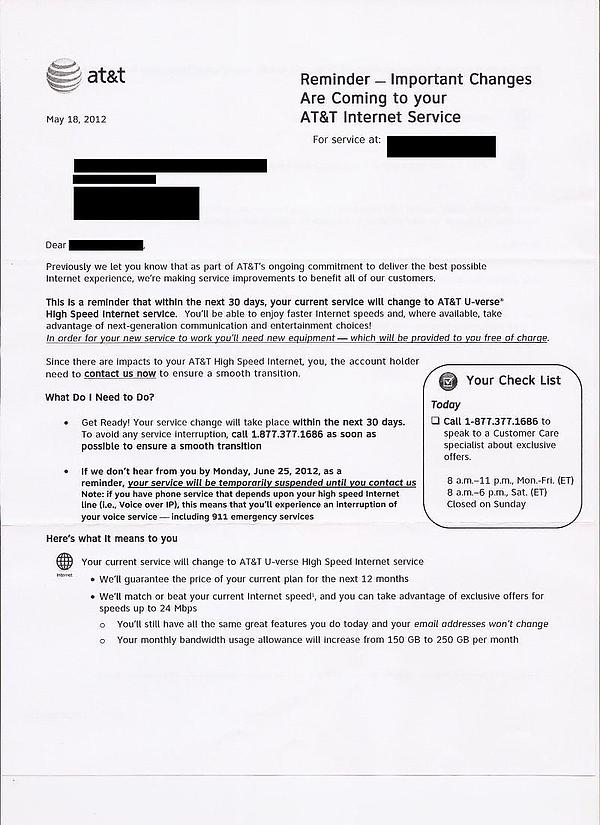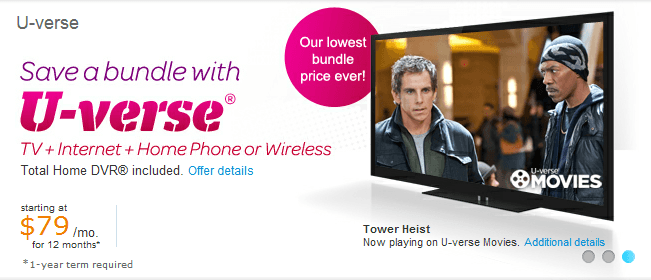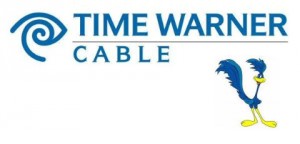AT&T is now forcing some of their customers relying on the company’s traditional DSL service to upgrade to AT&T U-verse or face service suspension.
The latest customers impacted by AT&T’s forced upgrade are in parts of Connecticut.
“This is a reminder that within the next 30 days, your current service will change to AT&T U-verse High Speed Internet,” reads the letter mailed to customers facing the mandatory transition. Unfortunately, customers have to call AT&T to arrange for new equipment if they want their service to continue uninterrupted — existing DSL modems don’t work with U-verse.
Callers who dial the toll-free number in the letter get to order the U-verse equipment for free, but they routinely endure a hard sales pitch selling U-verse video and phone service as well, at a corresponding higher price. Customers are sent self-install kits at no charge and are offered the same rate they currently pay for DSL, sometimes with faster speeds on the U-verse network. But after one year, regular U-verse prices apply, and they are often significantly more expensive than traditional DSL service.

A Broadband Reports reader in Conn. shared a copy of the AT&T U-verse upgrade letter posted on that site's AT&T forum.
The promotional prices offered to Stop the Cap! reader Ralph were not as good as what he was currently paying for basic DSL on a promotion he purchased earlier.
“I am now paying $14.95 a month under the promotion I am on now and AT&T first tried to sell me a plan that cost $5 more,” Ralph writes. “They quickly agreed to keep my current promotional price after I told them about it, but what they will not tell me is what I will pay after the one year is up, nor can I find U-verse regular pricing on AT&T’s website.”
AT&T is currently promoting Internet-only promotional pricing as follows: Basic Internet: $19.95, Express Internet: $19.95, Pro Internet: $19.95, Elite Internet: $24.95, Max Internet: $29.95, Max Plus Internet: $34.95, Max Turbo Internet: $44.95. We could not find a disclosure of what the regular prices would be after the one-year contract expired, and that bothers Ralph.
“I realize they are going to match my 3Mbps service on U-verse, but somehow I suspect the regular U-verse price is going to come higher than the DSL service I have been using,” he says.
Ralph’s intuition is correct. Stop the Cap! called AT&T at the number provided on the letter and spoke with a customer service representative at the AT&T Web Sales Center. Although AT&T will ship the required equipment (a wireless router/modem combo) at no charge, AT&T will eventually make that money back charging customers higher prices for Internet service.
Current regular pricing for Ralph’s DSL service after his promotion ends will cost him $24 a month for 3Mbps service. U-verse charges $38 a month (off promotion) for the same speed service — a $14 monthly difference.
“That sucks,” Ralph said after we shared the news. “Why should I have to change what works fine right now?”
AT&T says keeping DSL in certain U-verse upgrade areas is not possible. In fact, AT&T’s letter warns, if customers do not call to arrange for the U-verse “upgrade” by a certain date, their broadband service will be suspended. That could be a problem for customers who also use their broadband account with an Internet-based phone line.
“There goes 911 or any other emergency calling,” Ralph reminds us. “Thanks, AT&T.”
Some customers who have completed their U-verse upgrade report AT&T messed up their subsequent billing, charging full price instead of an agreed-upon promotion. Slickdeals members report AT&T often requires constant reminding to fix billing errors that generally hand customers higher bills than they expected.
“I am trying real hard to figure out how this represents the ‘next evolution of communications’ AT&T writes about in their letter,” Ralph concludes. “All I am going to eventually get is a much higher bill for a service I don’t want or need. I guess it’s time to call the cable company again.”


 Subscribe
Subscribe








